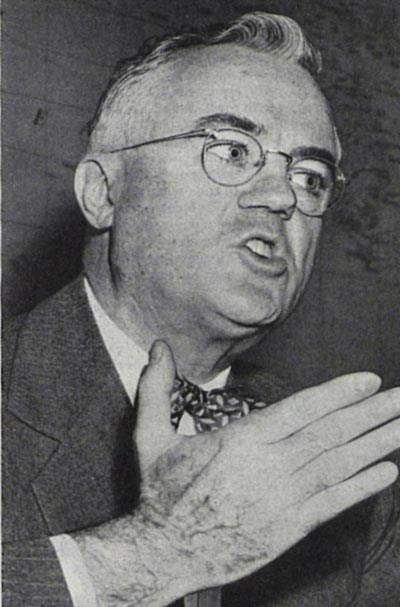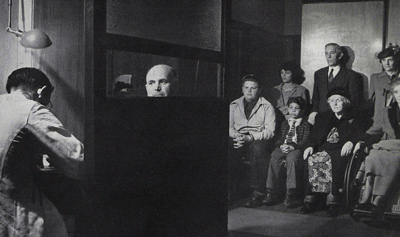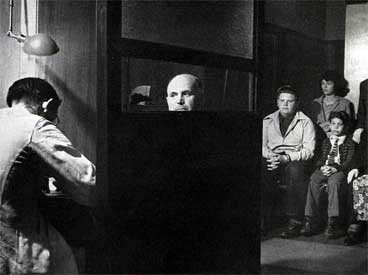In the following article, Post writer Steven Spencer examines legislation—spearheaded by President Truman—to nationalize U.S. healthcare. We think you’ll find it interesting how closely the arguments in this 1949 report echo today’s healthcare debate.
[See also: “Fixing Our Healthcare System” from our Sep/Oct 2012 issue.]

May 28, 1949—For the eighth time in 10 years the American people are being urged to let the Government pay their doctors for them, with money collected from the American people. The system is called compulsory health insurance, and the theory is that everybody who doesn’t have enough medical care today will surely have it tomorrow, because the Government will see to it that he does.
Between theory and practice there is a tremendous gap, much of which is currently being filled with arguments. Many of them fall in a familiar groove, but they are pitched this time against a more substantial background than heretofore, namely, the actual experience of 48 million residents of Great Britain under a comprehensive National Health Service. The scheme entitles everyone in Britain, visitors as well as citizens, to all medical, dental, and hospital care at the expense of the taxpayers.
Curiously, Britain is being called to give testimony for both sides of the American controversy. Many of those who want compulsory health insurance cite the British plan as a shining example for us to follow. Their opponents, including the American Medical Association, point to the same program as a warning of dire things to come if we adopt any Government-directed system and propose, instead, an extension of voluntary health insurance, with financial help from state and Federal governments.
What is the story? Should Britain’s 11 months of nationalized medicine—socialized if you use the broad definition of that term—cause us to embrace or reject the compulsory plan so insistently advanced by President Truman, Federal Security Administrator Oscar R. Ewing, and the Wagner-Murray-Dingell group in Congress? In this article we shall look for an answer by examining the Administration’s health insurance plan in the light of the British experience.
The explanation for the two-way character of the British evidence is that, where there are as many people of intelligence and good will as one finds in England, no plan for the care of the sick will be a 100 percent failure—at least not at first. Most people are willing to give it a sporting chance. Even the British doctors, while swearing under their breath—and sometimes audibly—at Minister of Health Aneurin Bevan and the scheme which he and Parliament pushed through over their opposition, are trying sincerely to make it function. And certainly the majority of the working people—whose purchasing power has for years been much below that of Americans at comparable jobs—welcome a form of medical care supported mainly by taxes on the middle- and upper-income groups.
Yet it is highly significant that nearly everyone with whom I talked in England had some reservations about the scheme. People felt that too many were abusing it and thus jamming the traffic in the doctors’ offices, that many physicians were being overworked and underpaid, that dentists and eyeglass dispensers were making a killing, that the administrative machinery was cumbersome, slow, and inefficient. Even one of the government’s own regional officers remarked that “most people would not be so mad as to take over such a large thing all at once.”
The temptation to buy the whole package at one time is very great in this period of increasing dependence on government. In fact, the first danger in any proposal for government medicine lies in the ease with which it can be glamorized. Like the bodybuilding courses that come with a pair of 25-pound dumbbells, it looks magnificent on paper. Unfortunately, the result is usually far short of the pictorial promise in the advertisement. The dumbbell system has one advantage, though. If, after a few weeks, you are dissatisfied with your rate of deltoid development, you can stow the dumbbells in the attic and forget them. State medicine is not so easily shucked off, once you have installed it.
A good many of the British people admit they bought Bevan’s system a bit too hastily, and they now confess to a feeling of disillusionment. They had been won over by the bright promises of everything for everybody. Now that the scheme has been in operation almost a year, their enthusiasm has dimmed.
Three North of England women expressed this reaction in strikingly similar terms. Said a hospital superintendent, “I was for the plan, but this transitional period sometimes makes you wonder if it is worth while.” Then she added, “But I do think it will work out eventually.”
A miller’s wife, formerly a nurse, remarked, “I thought beforehand that nationalization of the hospitals would be good, but now that I’ve seen how it works out, I think I was wrong. … The county hospitals are operating 10 automobiles where they were running only one before. … Everybody feels he must get what he can out of the government before someone else does.”
And a woman doctor, brushing a wisp of blond hair out of her eyes as she signed a sheaf of certificates and orders, confessed, “I was for the plan, but now we family doctors seem to be in danger of becoming simply form fillers and traffic officers, shunting people to this hospital or that specialist.”
Some of the British criticism of the National Health Service is bound up in a growing dislike of the whole idea of the welfare state, in which food, housing, fuel, and now medical care are at least partially provided by the government.
One of England’s leading medical scientists, head of an important government council, feels so strongly on this point that he told me, “If I were a young man in England today, I would get out and go somewhere else. I don’t object to seeing that the poor get enough to eat,” he said, “but why should I be taxed to the limit to put bread in the mouth of the employed worker, who should work hard enough and be paid enough so that he can buy his own food without heavy subsidies?” The comment is frequently heard in England that so much subsidizing is destroying the people’s initiative.
While the British health program differs in details from the compulsory health-insurance measure of Senators Robert F. Wagner and James E. Murray; and Congressman John Dingell; and their cosponsors, the two plans are cut on the same basic pattern. Both spread the wings of government-directed medicine over all or nearly all of the population. Both lean heavily on central government authority. And both are compulsory in that all wage earners and taxpayers must pay for the services, whether or not they approve them or make use of them.

The scope of the new Wagner-Murray-Dingell bill is not quite so broad as that of Bevan’s plan, since the former would cover only those under Social Security, with a few additional categories. But the trend is to broaden Social Security to take in almost everyone. “We aim to have everyone who is the head of a family become taxable,” explains Mr. Dingell, “so that he and all his dependents under 18 would be entitled to benefits. … Why, this is the most liberal proposition in the world.”
Many of Mr. Dingell’s opponents think his bill is far too liberal. Why, they ask, should tax-supported medical care be offered to everyone, the $10,000-a-year man as well as the family getting along on $1,500? The coverage of government medicine is one of the crucial issues of the whole controversy. Both sides agree that no one who needs medical care should be denied it because he is unable to pay. The opponents of compulsory insurance maintain that it is in the American tradition that those who are able to care for themselves and their families should not lean on government for help. The Wagner-Murray-Dingell group maintain it is too hard to determine who is able to care for himself and who isn’t, and that the easiest and fairest way is to make medical care freely available to everyone on the basis of compulsory wage deductions.
Mr. Dingell recalls that his own family lacked means for adequate medical care when he was a boy. “I contracted diphtheria,” he said, “at a time when it cost 25 dollars a shot for anti-toxin. My family couldn’t afford that, and I guess I was one of the very few who pulled through without it.”
He declares that he has seen people refused admission to hospitals because they had no money, and he cites the case of a man brought in from the street in Detroit with third-degree burns. “Because no one, including the policeman who brought him in, could insure the fellow’s bill,” Dingell said, “the patient was turned away from one hospital and had to be carried clear across town to the city receiving hospital. Under a system in which every hospital knew the Government would pay every patient’s bill, this would not have happened.”
Become a Saturday Evening Post member and enjoy unlimited access. Subscribe now




Comments
Thanks for the article.
Here’s my comment – really just a couple of questions;
I’m wondering if, aside from England where the new system is in it’s infancy, there are any other countries with national health care systems of longer standing. It’s be interesting to me to see how they’ve made out & how they’ve worked out the kinks and what things have yet to be worked out.
And what part do the interests of insurance companies play, everyone knows that money is a big player in the way things are decided in Washington.
That’s it